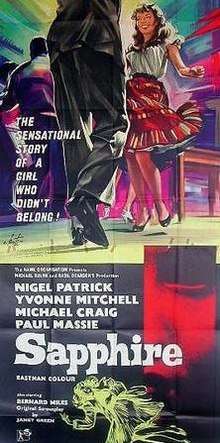Sapphire (film)
Sapphire is a 1959 British crime drama film. It focuses on racism in London toward immigrants from the West Indies and explores the "underlying insecurities and fears of ordinary people" that exist towards another race.[1] The film was directed by Basil Dearden and stars Nigel Patrick, Earl Cameron and Yvonne Mitchell. It received the BAFTA Award for Best Film and screenwriter Janet Green won a 1960 Edgar Award from the Mystery Writers of America for Best Foreign Film Screenplay.[2] It was considered a progressive movie for its time.[3]
| Sapphire | |
|---|---|
 UK release poster | |
| Directed by | Basil Dearden |
| Produced by | Michael Relph Earl St. John (executive producer) |
| Written by | Janet Green |
| Starring | Nigel Patrick Yvonne Mitchell Michael Craig Paul Massie Earl Cameron Bernard Miles |
| Music by | Philip Green |
| Cinematography | Harry Waxman |
| Edited by | John D. Guthridge |
Production company | Artna Films |
| Distributed by | Rank Film Distributors |
Release date |
|
Running time | 92 minutes |
| Country | United Kingdom |
| Language | English |
Earl Cameron, who played the part of Sapphire's brother,[1] would appear two years later in another English film dealing with racial issues, the film Flame in the Streets (1961).[4]
Plot
The body of a young woman is found on Hampstead Heath, stabbed to death. Although appearing to be white, when her brother (Earl Cameron) arrives at the police station to give evidence, the officers are surprised to see that he is black. He explains that they were the mixed-race children of a black mother and a white father, but Sapphire has recently been passing for white.[5] Sapphire's white boyfriend, a student, immediately becomes the chief suspect. He is followed by plainclothes police and seen acting suspiciously around the crime scene. The discovery in the police postmortem that Sapphire was 3 months pregnant is an added complication. As the investigation proceeds other aspects of Sapphire's social life bring further suspects to light.
Cast
- Nigel Patrick as Superintendent Robert Hazard
- Yvonne Mitchell as Mildred Farr
- Michael Craig as Inspector Phil Learoyd
- Paul Massie as David Harris
- Bernard Miles as Ted Harris
- Olga Lindo as Mrs. Harris
- Earl Cameron as Dr. Robbins
- Gordon Heath as Paul Slade
- Jocelyn Britton as Patsy
- Harry Baird as Johnnie Fiddle
- Orlando Martins as Barman
- Rupert Davies as P.C. Jack Ferris
- Freda Bamford as Sergeant Cook
- Robert Adams as Horace Big Cigar
- Yvonne Buckingham as Sapphire Robbins
- Vanda Hudson as Blonde Girl at Tulip's Club (uncredited)
- Philip Lowrie as Student (uncredited)
- Boscoe Holder as Dancer in Nightclub (uncredited)
- Basil Dignam as Doctor Burgess (uncredited)
- Fenella Fielding as Lingerie Shop Manageress (uncredited)
- Lloyd Reckord as Pianist in The International Club (uncredited)
- Peter Vaughan as Detective Whitehead (uncredited)
- Victor Brooks as Police Sergeant (uncredited)
- Desmond Llewelyn as Policeman (uncredited)
- Barbara Steele as Student in café (uncredited)
- Dolores Mantez as Student at the International Club (uncredited)
Reception
Critical reception
Nina Hibbin, writing about the film on its initial UK release in the Daily Worker, commented: "You can't fight the colour bar merely by telling people it exists. You have to attack it, with passion and conviction. Commit yourself up to the hilt. Otherwise you're in danger of fanning the flames".[6]
At the time of the film's US release, The New York Times reviewer A.H. Weiler wrote that while it is "not entirely in a class by itself, the combination of murder mystery and racial issues puts it several interesting cuts above standard movie melodrama".[7]
The reviewer for the British Film Institute's Screenonline website writes: "Dearden is not immune to prevailing prejudices, equating a young woman living alone in London with promiscuity, and seeing an enthusiasm for jazz as evidence of dubious character. The film is littered with casual, unchallenged racism".[6]
Box Office
The film reportedly made a profit of £100,000.[8]
Paperback novelisation
In April 1959, Panther Books of London issued a screenplay novelisation by prolific mystery and thriller novelist E.G. Cousins.
References
- screenonline Sapphire (1959)
- Awards for Sapphire on IMDb
- "Britmovie.co.uk".
- Britmovie.co.uk Flame in the Streets Archived 21 March 2009 at the Wayback Machine
- Britmovie.co.uk Features, Sapphire (1959) by David Cairns
- Ogidi, Ann (2003–14). "Sapphire (1959)". BFI Screenonline. Retrieved 1 July 2020.
- Weiler, A.H. (3 November 1959). "Sapphire; British Crime Story Opens at Sutton". The New York Times. Retrieved 1 July 2020.
- Hill, William John (1985). CLASS, SEXUALITY AND THE*BRITISH CINEMA 1956-63 (PDF) (Thesis). University of York. p. 375.
External links
- Sapphire on IMDb
- Sapphire at Rotten Tomatoes
- A. H. Weiler, "The Screen: 'Sapphire'; British Crime Story Opens at Sutton" (review), The New York Times, 3 November 1959.